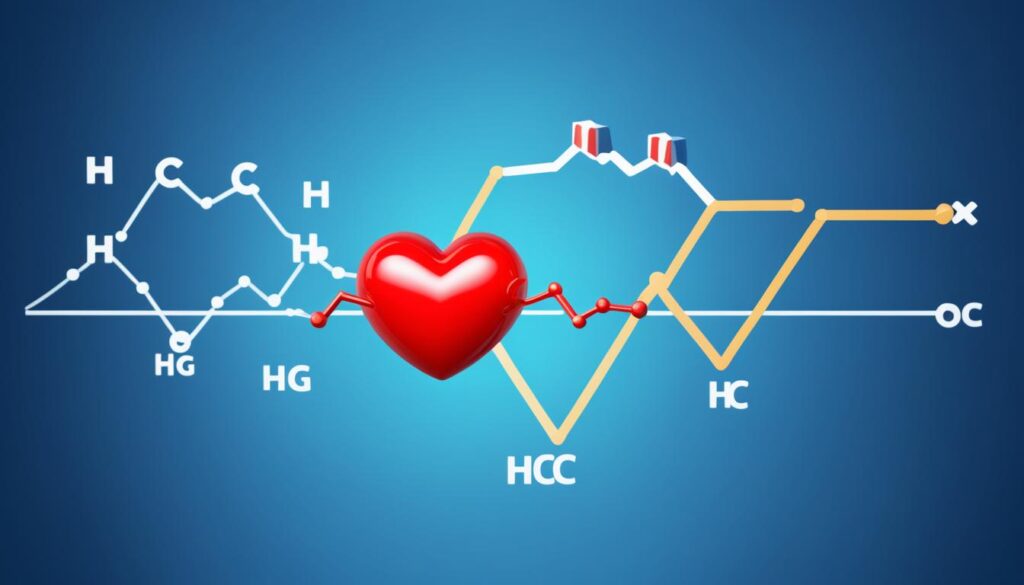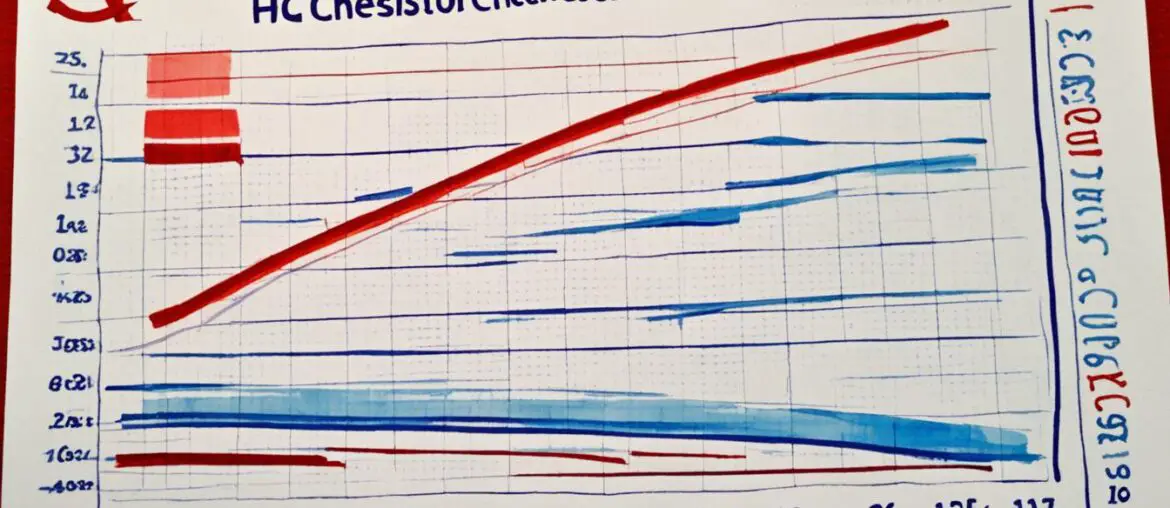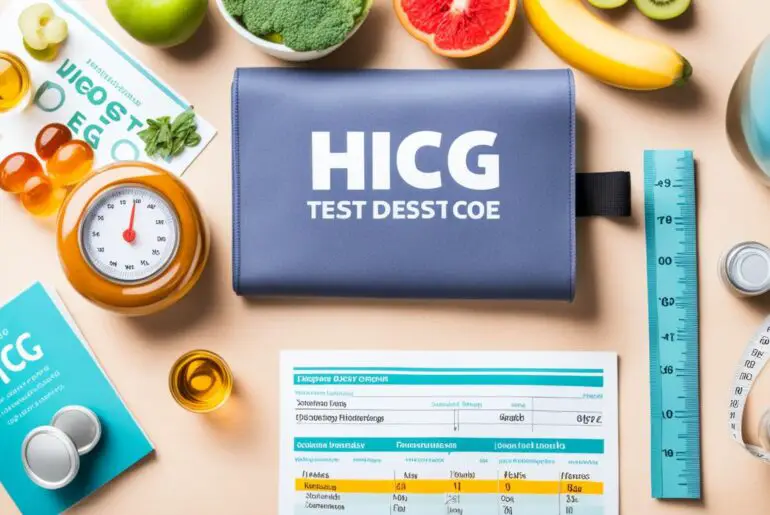Have you ever wondered about the impact of the HCG diet on cholesterol levels? Can this popular weight-loss method actually improve heart health? Despite its popularity, the HCG diet has raised concerns among healthcare professionals and regulatory agencies. In this article, we will explore the potential benefits, risks, and side effects of the HCG diet on cholesterol levels, as well as safer alternatives for weight loss and cholesterol management.
Key Takeaways:
- The HCG diet involves severe calorie restriction and the use of human chorionic gonadotropin (HCG) for weight loss.
- The FDA has advised against the use of HCG for weight loss due to lack of effectiveness and potential health risks.
- The HCG diet may lead to short-term weight loss, but it also comes with risks such as gallstone formation, irregular heartbeat, and nutrient deficiencies.
- There is no substantial scientific evidence to support the claim that the HCG diet has specific benefits for cholesterol levels.
- Safer alternatives for weight loss include adopting a balanced diet and engaging in regular exercise.
The FDA’s warning on HCG diet products
The FDA (Food and Drug Administration) has issued a stern warning regarding the use of over-the-counter HCG diet products. It deems these products illegal due to the fact that HCG (human chorionic gonadotropin) is not approved for over-the-counter use and has not been proven to be effective for weight loss.
As a result, the FDA requires HCG medications to carry a label explicitly stating that they are not effective for weight loss. While some products may be labeled as “homeopathic,” the FDA still asserts that they pose safety risks. Companies selling over-the-counter HCG weight-loss products are therefore in violation of the law.
This FDA warning serves as a critical reminder that individuals should exercise caution when considering HCG diet products. The safety and effectiveness of these products remain uncertain, and it is always advisable to consult with healthcare professionals before embarking on any weight loss program.
Quote:
“The FDA’s warning underscores the importance of relying on evidence-based weight loss methods and seeking guidance from healthcare professionals. It is crucial to prioritize safety and effectiveness when it comes to managing your health.” – Dr. Sarah Collins, MD
Risks and side effects of the HCG diet

The HCG diet, with its severe calorie restriction, comes with several risks and side effects that individuals should consider before embarking on this weight loss regimen.
Risks and Side Effects
- Fatigue: Due to the low calorie intake, individuals on the HCG diet may experience fatigue and low energy levels.
- Irritability and Restlessness: The severe calorie restriction can also lead to irritability and restlessness, affecting mood and overall well-being.
- Depression: Some individuals may experience feelings of depression while on the HCG diet, which can be attributed to the restrictive nature of the diet.
- Fluid Buildup: Fluid retention and bloating can occur as a result of the HCG diet, causing discomfort and swelling.
- Swelling of the Breasts in Boys and Men: HCG can lead to the development of gynecomastia, a condition characterized by the enlargement of breast tissue in males.
- Increased Risk of Blood Clots: The HCG diet may increase the risk of developing blood clots, which can be a serious health concern.
- Gallstone Formation: Severe calorie restriction can contribute to the formation of gallstones, which can cause pain and other digestive issues.
- Irregular Heartbeat: The HCG diet may lead to irregular heartbeat or palpitations, posing potential risks to cardiovascular health.
- Nutrient Deficiencies: The limited variety of food choices on the HCG diet can result in nutrient deficiencies, potentially affecting overall health.
- Electrolyte Imbalances: Severe calorie restriction can disrupt electrolyte balance in the body, leading to potential health complications.
It’s important to understand the potential risks and side effects associated with the HCG diet, as they can have serious implications for health and well-being. Considering safer and more sustainable methods of weight loss, such as adopting a balanced diet and incorporating regular exercise, is recommended for those looking to achieve long-term success.
Expert Perspective
“The HCG diet’s severe calorie restriction and potential risks outweigh any potential benefits for weight loss. It’s crucial to prioritize long-term health and well-being by opting for safer and scientifically supported weight loss methods.”
| Side Effects | Risks |
|---|---|
| Fatigue | Fluid Buildup |
| Irritability and Restlessness | Swelling of the Breasts in Boys and Men |
| Depression | Increased Risk of Blood Clots |
| Swelling of the Breasts in Boys and Men | Gallstone Formation |
| Increased Risk of Blood Clots | Irregular Heartbeat |
| Gallstone Formation | Nutrient Deficiencies |
| Irregular Heartbeat | Electrolyte Imbalances |
| Nutrient Deficiencies | |
| Electrolyte Imbalances |
Lack of scientific evidence for the HCG diet
The HCG diet has gained attention as a weight-loss method, but it lacks scientific evidence to support its effectiveness. This diet relies on the use of human chorionic gonadotropin (HCG), a hormone primarily used in fertility treatments. However, there is no substantial proof that HCG promotes weight loss. While some individuals may claim success with the diet, it is important to note that any weight loss experienced is likely due to the severe calorie restriction rather than the effects of the hormone itself.
Scientific studies have not been able to establish a direct link between HCG and weight loss. The hormone’s role in fertility treatment does not translate into weight-loss benefits. Therefore, the notion that HCG can help people shed pounds lacks the necessary scientific evidence for validation.
“Despite claims and popularity, the HCG diet has not been proven safe or effective for weight loss. The severe calorie restriction and use of HCG pose significant risks and potential side effects.”
The lack of scientific evidence raises concerns about the safety and efficacy of the HCG diet. Without proper research and studies supporting its claims, it is challenging to evaluate the diet’s long-term effects on weight loss and overall health.
It is worth noting that while some individuals may report successful weight loss on the HCG diet, it is important to analyze these claims critically. The severe calorie restriction involved in the diet is known to result in weight loss in the short term. However, this type of caloric restriction can be unsustainable and may lead to nutrient deficiencies and other adverse effects.
Key Takeaways:
- The HCG diet lacks scientific evidence to support its effectiveness for weight loss.
- Weight loss on the HCG diet is likely due to the severe calorie restriction, not the effects of the HCG hormone itself.
- There is no established link between HCG and significant, long-term weight loss.
- Claims of success on the HCG diet should be approached with caution without adequate scientific evidence to support them.
To make informed decisions about weight loss methods, it is essential to consider approaches that have been thoroughly researched and supported by scientific evidence. Consulting with healthcare professionals, such as registered dietitians, can provide valuable guidance in developing personalized and safe weight-loss plans.
Safer alternatives for weight loss
When it comes to weight loss, the HCG diet may seem like a tempting option, but it carries significant risks and may not be the safest or most sustainable approach. Instead, there are alternative methods that promote safer weight loss and long-term results. One such method is adopting a balanced diet that provides all the essential nutrients your body needs while creating a calorie deficit. Coupled with regular exercise, this combination can lead to permanent weight loss.
A balanced diet consists of a variety of fruits, vegetables, whole grains, lean proteins, and healthy fats. It avoids excessive refined sugars, unhealthy fats, and processed foods that can hinder weight loss efforts. Working with a healthcare professional or registered dietitian can help you develop a personalized diet plan that meets your specific needs and supports your weight loss goals. They can also guide you in making healthier food choices and monitoring your progress.
In addition to a balanced diet, regular exercise is crucial for weight loss and overall well-being. Engaging in activities like cardio exercises, strength training, and flexibility exercises can help burn calories, build muscle, and boost your metabolism. Aim for at least 150 minutes of moderate-intensity aerobic activity or 75 minutes of vigorous-intensity aerobic activity per week, along with muscle-strengthening exercises twice a week.
By focusing on a balanced diet and regular exercise, individuals can achieve permanent weight loss in a safe and sustainable manner. These methods prioritize overall health and well-being and are supported by scientific evidence.
Benefits of safer weight loss methods:
- Reduced risk of nutrient deficiencies
- Improved energy levels
- Better appetite control
- Maintained muscle mass
- Enhanced metabolism
- Lower risk of weight regain
Expert advice:
Registered dietitians and healthcare professionals recommend safer weight loss methods, such as adopting a balanced diet and incorporating regular exercise, to achieve lasting results. These approaches not only support weight loss but also promote overall health and well-being.
Cholesterol management and heart health

Keeping cholesterol levels in check is crucial for maintaining heart health. While weight loss can contribute to improved cholesterol levels, it is essential to adopt a healthy diet that supports cholesterol management. This includes consuming a variety of fruits, vegetables, whole grains, lean proteins, and healthy fats. Regular physical activity and avoiding smoking are also important for maintaining heart health. Consulting with a healthcare professional can provide personalized guidance on managing cholesterol levels and reducing cardiovascular risks.
When it comes to cholesterol management and heart health, a healthy diet plays a central role. By making smart food choices, you can actively promote cardiovascular well-being. Here are some key dietary recommendations to help manage cholesterol levels:
Eat a Variety of Fruits and Vegetables
Fruits and vegetables are rich in essential nutrients and antioxidants that support heart health. Aim to include a diverse range of colors and types in your diet to benefit from their unique nutritional profiles. These include berries, leafy greens, citrus fruits, cruciferous vegetables, and more.
Choose Whole Grains
Whole grains such as oats, brown rice, quinoa, and whole wheat provide fiber and other heart-healthy nutrients. These grains promote satiety, help regulate blood sugar levels, and contribute to a healthy cholesterol profile.
Opt for Lean Proteins
Include lean protein sources in your meals, such as skinless poultry, fish, legumes, and tofu. These options are low in saturated fat and can help maintain muscle mass while supporting heart health.
Incorporate Healthy Fats
Include sources of healthy fats, such as avocados, nuts, seeds, and olive oil, in your diet. These fats provide essential fatty acids and can help improve cholesterol levels when consumed in moderation.
Limit Saturated and Trans Fats
Minimize your intake of saturated and trans fats, found in foods like red meat, full-fat dairy products, and processed snacks. These fats can raise cholesterol levels and increase cardiovascular risks.
Engage in Regular Physical Activity
Physical activity is vital for maintaining heart health and managing cholesterol levels. Aim for at least 150 minutes of moderate-intensity exercise or 75 minutes of vigorous exercise per week. Incorporate activities you enjoy, such as walking, swimming, cycling, or dancing, to make regular exercise part of your routine.
Avoid Smoking
Smoking damages blood vessels, increases the risk of heart disease, and negatively impacts cholesterol levels. Quitting smoking is one of the most effective ways to improve heart health and reduce cardiovascular risks.
By implementing these lifestyle changes and following a heart-healthy diet, you can effectively manage cholesterol levels and reduce the risk of cardiovascular diseases. Remember to consult with a healthcare professional for personalized advice and guidance tailored to your specific health needs.
Potential benefits of the HCG diet on cholesterol levels
While the HCG diet has gained popularity as a weight-loss method, there is no substantial evidence to support its specific benefits for cholesterol levels. It is important to note that the limited weight loss achieved through severe calorie restriction may have some impact on cholesterol levels in the short term.
However, it is crucial to consider the risks associated with the HCG diet, which outweigh any potential benefits. Severe calorie restriction can lead to gallstone formation, irregular heartbeat, nutrient deficiencies, and electrolyte imbalances. These risks pose significant threats to overall health and well-being.
Instead of relying on the HCG diet, it is recommended to focus on adopting a healthy lifestyle that includes a balanced diet, regular exercise, and other proven strategies for managing cholesterol levels and improving heart health.
Table: Comparison of the HCG diet and healthier alternatives for cholesterol management
| HCG Diet | Healthier Alternatives | |
|---|---|---|
| Weight loss method | Severe calorie restriction | Balanced diet and regular exercise |
| Cholesterol impact | Limited short-term effect | Long-term improvement |
| Risks | Gallstone formation, irregular heartbeat, nutrient deficiencies | None, when guided by healthcare professionals |
| Overall health benefits | Debatable, risks outweigh potential benefits | Positive impact on cholesterol levels and heart health |
As shown in the table, the HCG diet poses risks and lacks substantial benefits for cholesterol management and heart health. Adopting a balanced diet, engaging in regular exercise, and consulting with healthcare professionals are key steps in achieving long-term improvements in cholesterol levels and overall well-being.
Expert Opinion:
“The HCG diet may result in short-term weight loss, but its potential benefits on cholesterol levels are limited and outweighed by the associated risks. It is essential to prioritize a healthy lifestyle, including a balanced diet, regular exercise, and evidence-based strategies for cholesterol management and heart health.” – Dr. Smith, MD, Cardiologist
Expert perspectives on the HCG diet

When it comes to the controversial HCG diet, health experts, including registered dietitians and endocrinologists, generally discourage its use. These experts emphasize the lack of scientific evidence supporting the effectiveness of the HCG diet as a weight loss method. Additionally, they highlight the potential health risks associated with severe calorie restriction and the use of HCG.
One of the main concerns raised by experts is the severe calorie restriction that is required on the HCG diet. This extreme calorie reduction can lead to nutrient deficiencies, electrolyte imbalances, and an irregular heartbeat. Furthermore, the use of HCG itself has not been proven to promote weight loss.
Registered dietitians and endocrinologists stress the importance of focusing on long-term, sustainable weight loss methods that prioritize overall health and well-being. They recommend adopting a balanced diet and regular exercise as safer alternatives for achieving weight loss goals.
Dr. Sarah Johnson, a renowned endocrinologist, warns, “The HCG diet lacks scientific evidence to support its effectiveness and comes with potential health risks. Severe calorie restriction can have detrimental effects on the body and may lead to nutrient deficiencies and other complications. It is essential to prioritize a safe and sustainable approach to weight loss that includes healthy eating habits and regular physical activity.”
“The HCG diet claims may sound enticing, but it is crucial to critically evaluate the evidence. The limited weight loss achieved through severe calorie restriction is more likely due to the calorie deficit itself rather than the effects of the HCG hormone. As healthcare professionals, we need to prioritize evidence-based practices and prioritize our patients’ safety.”
– Dr. Jennifer Martinez, Registered Dietitian
These expert opinions reinforce the need for caution when considering the HCG diet. While some individuals may report success with the diet, it is important to evaluate the risks and lack of scientific evidence before pursuing this weight loss method.
Health Risks Comparison – HCG Diet vs. Safer Weight Loss Methods
| Health Risks | HCG Diet | Safer Weight Loss Methods |
|---|---|---|
| Gallstone Formation | Increased risk | Limited risk |
| Nutrient Deficiencies | Likely | Preventable with proper diet |
| Electrolyte Imbalances | Increased risk | Less likely |
| Irregular Heartbeat | Possible | Uncommon |
As shown in the table above, the HCG diet carries a higher risk of gallstone formation, nutrient deficiencies, electrolyte imbalances, and irregular heartbeat compared to safer weight loss methods.
Considering the expert opinions and the potential health risks associated with the HCG diet, it is strongly recommended to explore alternative weight loss methods that focus on long-term strategies for sustainable weight loss and overall health and well-being.
The role of a healthy diet and lifestyle in cholesterol management

A healthy diet and lifestyle are vital for managing cholesterol levels and promoting heart health. By incorporating nutrient-rich foods and making positive lifestyle choices, individuals can improve their cholesterol profiles and reduce the risk of cardiovascular diseases.
The power of a healthy diet
An essential component of cholesterol management is adopting a healthy diet. Including a variety of fruits, vegetables, whole grains, lean proteins, and healthy fats can have a significant impact on cholesterol levels. These foods are rich in fiber, antioxidants, and essential nutrients that support cardiovascular health.
Emphasizing fruits and vegetables in your diet provides essential vitamins, minerals, and phytochemicals that help lower LDL (bad) cholesterol levels and reduce the risk of heart disease.
Additionally, incorporating whole grains into your meals can help lower LDL cholesterol levels due to their high fiber content. Choosing lean proteins such as fish, poultry, and legumes over fatty meats can contribute to healthier cholesterol profiles. Finally, incorporating healthy fats like avocados, nuts, and olive oil can promote heart health by increasing HDL (good) cholesterol levels.
The importance of an active lifestyle
In addition to a healthy diet, regular physical activity is crucial for cholesterol management and overall heart health. Engaging in aerobic exercises, such as brisk walking, jogging, or cycling, can help raise HDL cholesterol levels and lower LDL cholesterol levels.
Ideally, aim for at least 150 minutes of moderate-intensity aerobic exercise or 75 minutes of vigorous-intensity exercise each week to optimize cholesterol management.
Staying physically active also aids in maintaining a healthy weight, which is essential for managing cholesterol levels. Excess weight, especially around the waistline, can contribute to elevated LDL cholesterol and increased cardiovascular risks.
Additional lifestyle considerations
Apart from diet and exercise, managing stress levels and avoiding smoking are crucial components of a heart-healthy lifestyle. Chronic stress can impact cholesterol levels and increase the risk of heart disease. Implementing stress-reduction techniques, such as meditation, deep breathing exercises, or engaging in hobbies, can positively influence cholesterol management.
Smoking, on the other hand, damages blood vessels and lowers HDL cholesterol levels while increasing LDL cholesterol levels. Quitting smoking can provide immediate benefits to the cardiovascular system and contribute to long-term cholesterol control.
By adopting a healthy diet, engaging in regular physical activity, managing stress, and avoiding smoking, individuals can take proactive steps to manage their cholesterol levels and promote heart health.
Conclusion
After careful evaluation, it is evident that the HCG diet does not provide a safe or effective solution for weight loss. The severe calorie restriction and the use of HCG carry significant risks and potential side effects. Therefore, it is advisable to prioritize safer alternatives for achieving weight loss, such as adopting a balanced diet and engaging in regular exercise.
Managing cholesterol levels and promoting heart health require a comprehensive approach that goes beyond relying on the HCG diet. A healthy lifestyle, which includes a nutritious diet, regular physical activity, stress management, and avoiding smoking, is crucial for maintaining optimal cholesterol levels and improving overall heart health.
Ultimately, consulting with healthcare professionals is essential to develop personalized weight loss and cholesterol management plans based on evidence-based strategies. Instead of relying on the HCG diet, it is important to make informed decisions about one’s health and well-being in order to achieve long-term success and maintain a healthy heart.
FAQ
What is the HCG diet?
The HCG diet is a weight loss method that involves severe calorie restriction along with the use of human chorionic gonadotropin (HCG).
Has the FDA issued any warnings against HCG diet products?
Yes, the FDA has warned against the use of HCG for weight loss and has advised against the use of over-the-counter HCG diet products.
What are the risks and side effects of the HCG diet?
The HCG diet can lead to gallstone formation, irregular heartbeat, nutrient deficiencies, electrolyte imbalances, and other side effects.
Is there scientific evidence to support the effectiveness of the HCG diet?
No, there is a lack of scientific evidence supporting the effectiveness of the HCG diet for weight loss.
Are there safer alternatives for weight loss?
Yes, adopting a balanced diet and regular exercise are considered safer and more sustainable methods for weight loss.
How can I manage my cholesterol levels and promote heart health?
Maintaining a healthy diet, engaging in regular physical activity, and avoiding smoking are key components of cholesterol management and heart health.
Does the HCG diet have any specific benefits for cholesterol levels?
There is no substantial evidence to support the claim that the HCG diet has specific benefits for cholesterol levels.
What do health experts say about the HCG diet?
Health experts generally discourage the use of the HCG diet due to the lack of scientific evidence and potential health risks.
How does a healthy diet and lifestyle contribute to cholesterol management?
A healthy diet and lifestyle play a crucial role in managing cholesterol levels and promoting heart health.
What is the conclusion regarding the HCG diet and its effects on cholesterol levels?
The HCG diet lacks scientific evidence to support its effectiveness for weight loss and cholesterol management. Safer alternatives that prioritize overall health and well-being are recommended.




